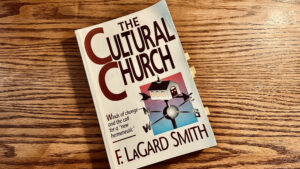
Over the last few years I have read more books than I have ever in my whole life. Mainly thanks to the educational work that I have accomplished. Otherwise, I’m not sure I would have read as many books as I have. There are several books that I could recommend and then some that I would say are sent waste your time because they are too difficult or boring (just being honest). However, The Cultural Church by F. LaGard Smith is one that I highly recommend if you want to grow in your faith, grow in your spiritual maturity, and grow in your biblical knowledge.
Smith, explains to the reader that the church is at risk of becoming a “cultural church”. What he means is that the church is at risk to give in to the culture around us as it changes and therefore we will forget the authority of God’s written Word. This change does not happen quickly but so slowly in fact that we don’t even realize how far we have changed. We become far removed from where we began. Smith argues that we need to stick to a Biblical method of hermeneutics. Smith defines hermeneutics as the “method by which we either understand the original intent of Scriptures or, how we decide which things we read about in the Bible are important for us to practice as Christians today.” Hermeneutics is the method of interpreting and applying scripture. Smith explains that the call for the “new hermeneutic” assumes that there is an old hermeneutic.
Smith’s central thesis compels us to look at the “old hermeneutic” of Command, Example and Necessary Inference and compare it to the call for a new more narrative hermeneutic. He shows the error of relying too much on the narrative hermeneutic and balances it all out by pointing out some misguidings in the church’s “old hermeneutic”. The book is intended to expose a radically changing world around us that is caught up in a culture that elevates personal “intuitive self direction over rational pursuit of God’s truth” as found in the scriptures.
I agree with most of what is written in this book because the church is at risk of becoming solely a “cultural church”. We are at risk of becoming a people that will do what is right when it fits what we want or what we prefer. We have fallen for the age old trick of the devil, to do what is right in our own eyes and not consider what God has ordained as right and wrong. The call for us to look deeper into a “not so new” pattern of hermeneutics is appealing. Perhaps we will better understand “commands, examples and necessary inference” when we look for the “purpose, principle and precedent”. Smith’s arguments found in this book will, for the most part, appeal to those that are in the fellowship of the churches of Christ. However, those that are not in our fellowship will not agree with Smith when it comes to some of the issues like baptism, women’s role, instrumental music, and partaking of communion.
The Cultural Church is page turner that is still just as relevant today as when it was first published over twenty five years ago. I found myself thinking how this book could have been written yesterday because of how the message rings true today. I think this is a fantastic book and I would recommend it to anyone who wants to deepen their understanding on the study of Biblical hermeneutics.
If anyone want to borrow my copy you are welcome to it. Just let me know.
God loves you and so do I,
Alex

